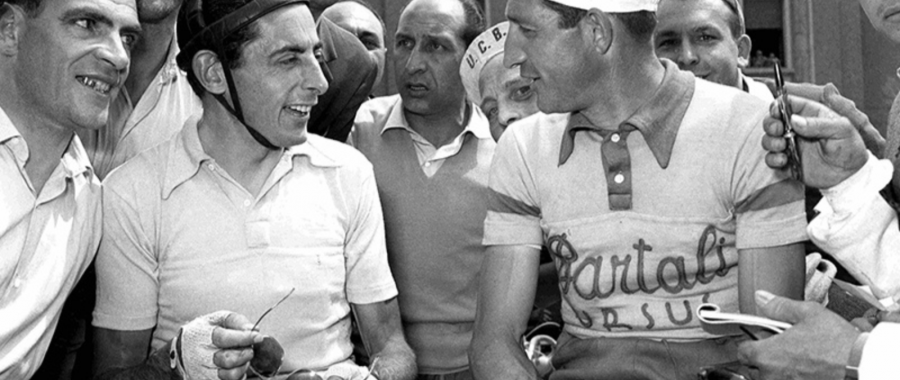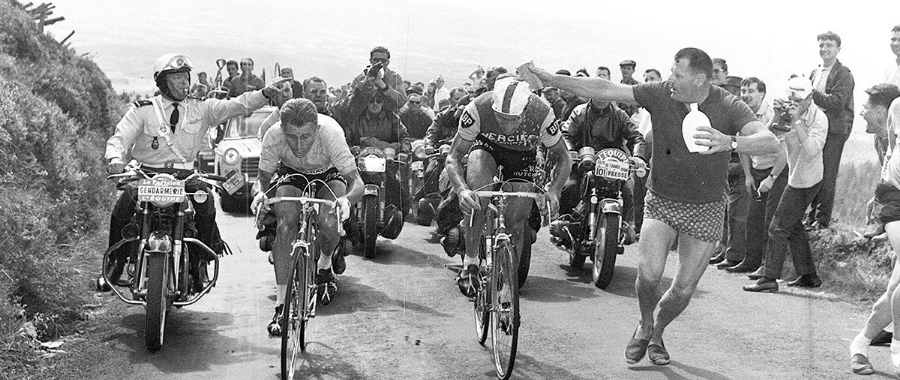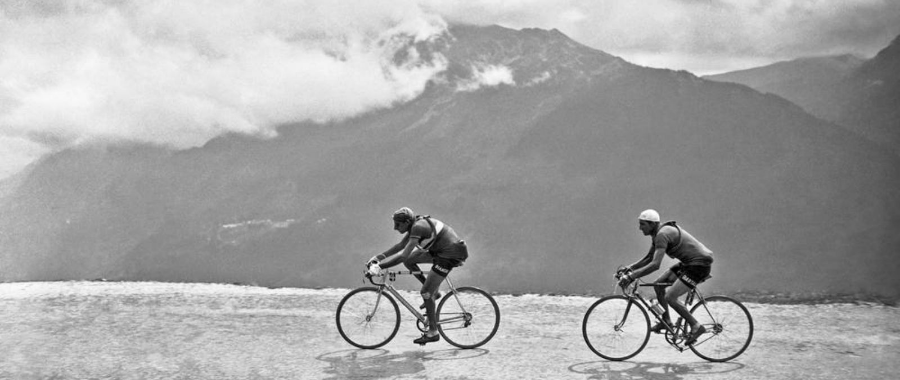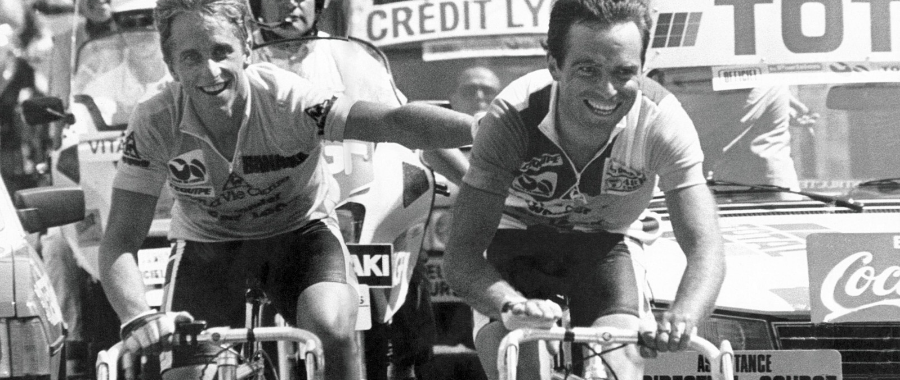The rivalry between Fausto Coppi and Gino Bartali during the 1949 Tour de France is one of the most celebrated and dramatic episodes in the history of cycling. These two Italian giants, who had already achieved legendary status in the sport, competed in the same team (between 1930 and 1961 national teams were invited to the Tour de France, thus this situation was different to the beef between Bernard Hinault and Greg LeMeond), but with very different goals, ambitions, and temperaments. Their competition that year not only captivated cycling fans but also transcended the sport, becoming a metaphor for the divided nature of post-war Italy.
The Tour de France of 1949 was not just a race.
It was a stage on which the intense personal, political, and national rivalry between two of the greatest cyclists the world has ever seen played out in unforgettable fashion.
By 1949, Gino Bartali and Fausto Coppi were already household names, not just in Italy but across Europe. Bartali, the elder of the two by five years, was a deeply religious man from Tuscany who embodied the traditional values of perseverance and loyalty. His devout Catholic faith, his rugged appearance, and his reputation as a climber with incredible endurance made him a national hero, particularly in the difficult years surrounding World War II. Bartali had already won the Tour de France twice, in 1938 and 1948, and his victory in 1948 was seen by many as a unifying moment for a war-torn Italy that was on the verge of political chaos.
On the other hand, Fausto Coppi was younger, leaner, and more of a natural talent. Born in Piedmont, Coppi’s style was elegant and efficient. After Costante Girardengo and Alfredo Binda , he was the third cyclist called “Il Campionissimo”
Unlike Bartali, who was seen as a symbol of the old Italy, Coppi represented modernity and progress. He was a rider who dominated time trials and excelled in both climbing and sprinting. In 1949, Coppi had already won the Giro d’Italia three times, including that same year, and had earned the distinction of being the first rider to achieve such success after World War II. However, despite his immense talent, he had yet to ride the Tour de France and was eager to make his mark on the world's most prestigious cycling race.
The relationship between Coppi and Bartali had been complex for years. While both were incredible athletes, they had very different personalities. Bartali was stubborn, traditional, and fiercely patriotic, while Coppi was more aloof, intellectual, and open to new methods of training and racing. This clash of styles and attitudes only fueled their rivalry, which had reached its peak by the time they arrived in France for the 1949 Tour.
The question of leadership
The tension between Bartali and Coppi was not lost on the Italian team’s manager, Alfredo Binda. He knew that he had two of the strongest riders in the world on his team, but he also understood that managing their egos would be just as challenging as managing the race itself. The question of leadership quickly became the defining issue of the Italian team in 1949. Bartali, as the elder rider with two Tour victories already to his name, expected to be the team leader, while Coppi, riding in his first Tour but fresh off a Giro victory, believed that his superior form should make him the designated leader.
Binda tried to handle the situation diplomatically, insisting that the road would decide who would lead the team. In theory, this was a wise approach, but in practice, it only exacerbated the rivalry. Coppi and Bartali were both driven by immense personal pride and national expectations, and neither was willing to back down. This tension came to a head early in the race.
MORE GREAT RIVALRIES
9 iconic moments of the Fausto Coppi -Gino Bartali rivalry
The rivalry between Fausto Coppi and Gino Bartali was one of the most iconic in cycling and Italian sports history, marked by athletic brilliance, ideological contrast, and deep personal drama. Beginning with Coppi’s breakthrough win in the 1940 Giro d’Italia under Bartali’s mentorship, the two developed a fierce competition that mirrored Italy’s postwar tensions—Bartali the… Read More »9 iconic moments of the Fausto Coppi -Gino Bartali rivalry
The battle on Puy de Dôme: Raymond Poulidor’s closest chance at Tour de France glory
The world of road cycling often celebrates the second-place riders as much, if not more, than the winners. Few embody this sentiment better than the legendary French cyclist, Raymond Poulidor (1936-2019), known affectionately as “The Eternal Second.” Over the course of his career, Poulidor competed in the Tour de France 14 times, completing 12 of… Read More »The battle on Puy de Dôme: Raymond Poulidor’s closest chance at Tour de France glory
The legendary rivalry between Fausto Coppi and Gino Bartali during Tour de France 1949
The rivalry between Fausto Coppi and Gino Bartali during the 1949 Tour de France is one of the most celebrated and dramatic episodes in the history of cycling. These two Italian giants, who had already achieved legendary status in the sport, competed in the same team (between 1930 and 1961 national teams were invited to… Read More »The legendary rivalry between Fausto Coppi and Gino Bartali during Tour de France 1949
Hand in hand on the top of Alpe d’Huez
Since its introduction to the Tour de France in 1952, Alpe d’Huez has been the scene of many legendary moments in cycling history. Among the most memorable is the iconic 18th stage of the 1986 Tour, when Bernard Hinault and Greg LeMond reached the summit hand in hand, in a symbolic gesture that belied the… Read More »Hand in hand on the top of Alpe d’Huez
The turning point
The defining moment in the rivalry came during Stage 5 of the 1949 Tour de France, a 200-kilometer stage that would prove pivotal. During this stage, Coppi broke away with the race leader, Jacques Marinelli, in an attempt to gain time and assert his dominance. However, disaster struck when Coppi crashed, and his bike was badly damaged. In a crucial moment, Coppi refused to accept just any replacement bike. He insisted on having his own spare bike, which caused a significant delay.
This moment highlighted the difference between the two riders. Bartali, who had also been in the breakaway, chose to stay with Coppi, showing sportsmanship and loyalty to his teammate despite their rivalry. Bartali waited patiently until team manager Alfredo Binda arrived with Coppi’s bike, but by the time they resumed racing, Coppi was already beginning to show signs of weakness. Hunger and exhaustion had set in, and his performance deteriorated rapidly.
Binda made the tough decision to release Bartali from waiting for Coppi, allowing him to ride ahead.
By the end of the stage, Coppi had lost a devastating 18 minutes, putting him a full 36 minutes behind Marinelli in the general classification.
That evening, Coppi, dejected and exhausted, seriously considered abandoning the race. He felt humiliated by the loss of time and was furious that Bartali had been allowed to ride away from him. Binda, realizing the gravity of the situation, had to step in and use all of his skills as a manager to persuade Coppi to continue. It was a difficult night for the Italian team, but Binda managed to convince Coppi to stay in the race, despite the significant time gap.
Coppi's comeback
While Coppi had suffered a severe blow in Stage 5, the next few days of the Tour would reveal the true extent of his character and ability. In Stage 7, a time trial, Coppi put on a masterclass of riding, winning the stage and reclaiming some of the lost time. His performance was a clear message to the rest of the peloton, and to Bartali in particular, that he was far from defeated. Coppi’s resilience was now on full display, and his victory in the time trial gave him a psychological edge, reminding everyone that he was capable of extraordinary feats.
Over the next stages, Coppi continued to chip away at the lead of the other riders, displaying his remarkable form in the mountains and on the flat stages alike. Bartali, too, was performing strongly, and the two Italians often found themselves battling for supremacy on the same stages. The dynamic between them was tense, with neither rider willing to publicly admit that the other might have the upper hand. However, behind the scenes, it was becoming clear that Coppi was beginning to take control of the race.
The decisive Alpine stages
The final blow in the Bartali-Coppi rivalry came during the decisive Alpine stages, where Coppi’s brilliance in the mountains truly shone. In Stage 17, which featured some of the most challenging climbs of the entire race, Coppi launched a devastating attack that left Bartali and the rest of the peloton struggling to keep up. By the time the stage was over, Coppi had gained a significant lead, not just over Bartali but over all his rivals.
In the following stage, which took the riders over the legendary Col d’Izoard, Coppi once again showed why he was considered one of the greatest climbers of all time. He rode away from the field, leaving Bartali far behind, and secured a commanding lead in the general classification. By the end of the Alpine stages, Coppi had all but guaranteed his victory in the 1949 Tour de France.
Fausto Coppi’s triumph in the 1949 Tour de France was historic not only because it marked his first victory in the race, but also because
it made him the first rider ever to win both the Giro d’Italia and the Tour de France in the same year.
His achievement of the Giro-Tour double cemented his status as one of the greatest cyclists in history, and it was a feat that had never been accomplished before. However, the victory also marked the end of a certain era in Italian cycling. Bartali, while still a revered figure, was now clearly in the twilight of his career, and Coppi had firmly established himself as the new leader of Italian cycling.



